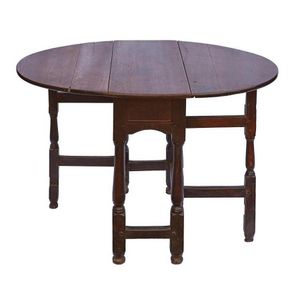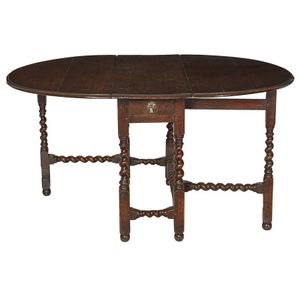18th Century Oak Gate Leg Table with Barley Twist Legs
You must be a subscriber, and be logged in to view price and dealer details.
Subscribe Now to view actual auction price for this item
When you subscribe, you have the option of setting the currency in which to display prices to $Au, $US, $NZ or Stg.
- Circa - A Latin term meaning 'about', often used in the antique trade to give an approximate date for the piece, usually considered to be five years on either side of the circa year. Thus, circa 1900 means the piece was made about 1900, probably between 1895 and 1905. The expression is sometimes abbreviated to c.1900.
- Oak - Native to Europe and England, oak has been used for joinery, furniture and building since the beginning of the medieval civilisation. It is a pale yellow in colour when freshly cut and darkens with age to a mid brown colour.
Oak as a furniture timber was superceded by walnut in the 17th century, and in the 18th century by mahogany,
Semi-fossilised bog oak is black in colour, and is found in peat bogs where the trees have fallen and been preserved from decay by the bog. It is used for jewellery and small carved trinkets.
Pollard oak is taken from an oak that has been regularly pollarded, that is the upper branches have been removed at the top of the trunk, result that new branches would appear, and over time the top would become ball-like. . When harvested and sawn, the timber displays a continuous surface of knotty circles. The timber was scarce and expensive and was used in more expensive pieces of furniture in the Regency and Victorian periods. - Stretcher - A horizontal rail which connects the legs of stools, chairs, tables and stands, to provide stabilisation of the legs. A stretcher table is any table with a stretcher base. The term is usually applied to substantial farmhouse tables, although many cabinetmaker's pieces, such as sofa tables, also have turned stretchers.
- Barley Twist - The leg, and frequently other uprights such as columns, chair frames, spindles and stretchers, are turned in fairly wide and deep spirals, usually slightly rounded. Also known as the 'Jacobean twist' and common on the dark stained Jacobean Revival furniture of the 1930s and 40s.
As a rule, the twists on opposite uprights should move in a contrary direction. Thus, if the spiral on a right side is clockwise, that on the left side should move in a counter-clockwise direction.
This is also true of rope-twist or cable-twist turning, a nautical term that came into fashion after Nelson's victories over the French fleet. The essential difference is that with rope twists, the spirals are more finely turned on the lathe and placed closer together, than they are with barley-sugar turnings.
This item has been included into following indexes:
Visually similar items

A Queen Anne joined oak gateleg table the oval top on block and turned supports with secret drawer, 78 cm x 65 cm high. Provenance: Purchased February 1972 from Johnstone Gallery, copy of receipt available

A George III country style oak cricket table, the circular two piece plank top raised on three splayed triangular section legs with triangular lower shelf, good dark colour. Diameter 80 cm, height 76 cm

An Edwardian mahogany circular top occasional table. Early 20th century. The top edge is decorated with inlaid border veneer. Height 70 cm. Diameter 45.5 cm

An early George III Cuban mahogany small dining table of oval form with hinged dropsides, supported on tapered slim legs and pad feet 75 x 144 x 132 cm
